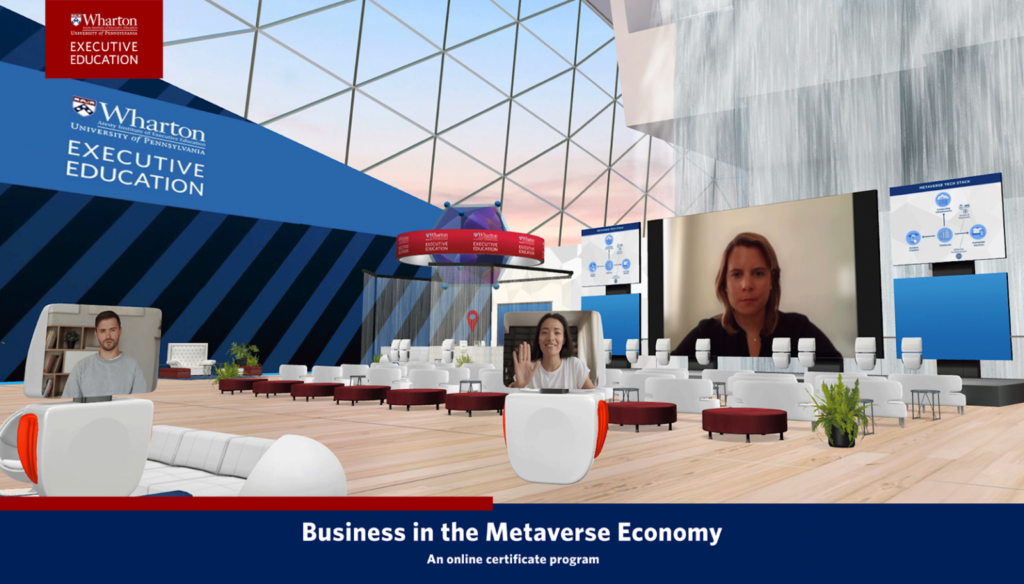
The Wharton School’s “Business in the Metaverse Economy” is the first exec ed course about the virtual space launched by an Ivy League business school. Courtesy photo
Listen to Mark Zuckerberg tell it, and the metaverse is where you’ll go, in the not too distant future, to buy your groceries, grab a beer with friends (or strangers), and have fencing bouts with holograms of Olympic gold medalists.
When Facebook changed its name to Meta last fall, it signaled in no uncertain terms the company’s all-in approach to the metaverse. There’s good reason for Zuckerberg’s optimism: Research analysts estimate that the metaverse economy will reach $13 trillion by 2030, powered by a range of emerging technologies such as augmented and virtual reality, according to a release from the Wharton School at University of Pennsylvania.

Kevin Werbach
The metaverse, a loosely defined term for connected virtual and mixed-reality environments, has the potential to reach into aspects of our economic and personal lives we haven’t yet imagined. Its impact will be broad enough that businesses will have to, at the very least, make intentional, informed decisions about whether or not to participate in the metaverse, says Kevin Werbach, a professor of legal studies and business ethics at the Wharton School who researches emerging technologies.
In that context, Wharton has launched a new exec ed course for business executives who hope to take advantage of meta’s emerging opportunities or who simply want to not be left behind. “Business in the Metaverse Economy” will accept its first students this September, making Wharton the first Ivy League business school to offer an exec ed course in the space.
“We designed this program for business professionals and executives from a range of backgrounds, including finance, management, and tech,” says Werbach, the program’s academic director. “The metaverse is a significant and broad phenomenon that is still poorly understood. We hope to equip business leaders, consultants, and entrepreneurs with an understanding of the impending opportunities the metaverse brings, as well as the practical knowledge to build solutions of value.”
We spoke with Werbach about the metaverse, its business potential, and the executives who need to pay attention. Our conversation has been edited for length and clarity. Find course highlights at the end of the article.
What is the metaverse?
One of the interesting challenges is that people struggle to define exactly what the metaverse is. There’s a lot of interest and excitement, in part because of Facebook/Meta making such a big commitment in the space as well as other companies that are involved, but people use the term “metaverse” to mean a number of different things. So, one of the first things that we do in the program is to provide a variety of definitions of the metaverse from different faculty members and show the common threads.
Metaverse isn’t just one thing. There’s a spectrum between, for example, a virtual games platform like a Roblox or Minecraft, which has some metaverse aspects, but are not fully immersive, open, virtual worlds, up to the VR platforms with digital assets where you really are completely enveloped in that reality. So the metaverse is really the sum total of those various moves towards more immersive, more persistent virtual spaces online.
Can you describe the backdrop for how this class came about? Why this class, right now?
My research is all in emerging technologies. I teach a lot about things like blockchain, and AI and so forth, and there are various courses in that area at Wharton. We hear from students that these are topics they’re interested in.
The immediate background was a program that launched in January called “Economics of Blockchain and Digital Assets,” which I’m also the academic director for. That was created because we saw a need for an online program about blockchain that was up to date and really got into the business realities of digital assets and blockchain today. We developed that program with a partner, Prysm Group, which is an economic consulting firm that works on emerging technologies, along with various faculty and industry experts, and it has been fantastically successful. Similarly, it’s a six week, open enrollment, executive education course.
We started getting feedback from students in that course that they wanted more. We did a survey about what topics they wanted to hear about that go beyond what’s in that program, and Metaverse was at the top of the list. It was a topic that partly builds on blockchain because many of these Metaverse platforms use non fungible tokens and blockchain foundations, but also goes off in other directions. When I started to talk to other Wharton faculty, I found, surprisingly, quite a few faculty who are not necessarily pure emerging tech experts, but they are, for example, marketing scholars who study brands and are very interested in what luxury brands or consumer brands are doing in these virtual spaces. We also have management scholars looking at the future of work in these kinds of virtual environments.
We then realized that a lot of the frameworks that we teach at Wharton about, for example, technology, strategy, the presence of disruptive technologies can be applied very well to this particular set of developments. We also did some testing and engagement with industry and potential audiences, and Metaverse is a big topic that’s on a lot of people’s lips. There’s really significant interest from a wide variety of business stakeholders coupled with very little good material out there. If you want to understand this at some serious level, where do you go? We felt that that was really an opportunity,
What is the format of the course? Will students have to have a VR headset?
The format is predominantly videos with asynchronous lectures and interviews, along with interactive exercises and case studies they do with teaching assistants. We have some interactive experiential demos and so forth, but we wanted to lower the barriers to people actually being able to find out about it. It’s about the business of the metaverse and the metaverse economy as opposed to the development or what it’s like being in a virtual space.
Speaking of the Metaverse economy, what are some business applications or models that are emerging?
It’s a range, and different instructors of course focus on different aspects. But, as I said, the marketing experts are really interested in brand building. What you can do with the programmability of an NFT that you can’t do with traditional marketing campaigns. Or, what you can do having the consumer in this fully immersive environment where you can interact with products and with brands in ways that you can’t do in real life. We also have examples from manufacturing firms using augmented reality to overlay on top of the real world for workers that provides a very direct, concrete business benefit in their factories.
It’s really the range of those different applications that was a part of what we’re interested in. What was striking for me as we put together the class was just how many different kinds of scenarios we wound up covering.
What kind of executives are you targeting?
From what we’ve seen from the blockchain class, it’s very horizontal. A lot of consultants who want to upscale and want to be thoughtful for their clients who are asking them questions. People in financial services trying to get a handle on the kinds of business metrics they’re seeing and what it means when they’re making predictions about those trillions of dollars of financial activity. Anyone who’s in an emerging tech company, because so many of them are now involved in one way or another in this metaverse space, whether it’s building hardware or thinking about how to participate in some of these virtual spaces. And then, the new marketing people dealing with consumer brands. There’s just so much activity, and they’re all asking well, Nike did this and Coke did that, should we do something similar?
I’m not sure how to quantify this, but do you think the metaverse will have a significant enough impact on the way we do business that executives will eventually have to dip their toes in, so to speak?
It’s something that business people are going to need to understand and be able to form a view on. There’s still a lot of uncertainty and there’s a lot of hype. We designed the course not to say everything is going to change and everyone’s going to be living in the metaverse all the time. We have material in the course about some of the concerns and dangers about privacy, content moderation and concentrated power potential of these platforms, and about appreciating the pros and cons and how to evaluate what’s real and what’s not.
But I think these more immersive experiences are quite powerful. They’re so broad in terms of their applicability that, yeah, I think pretty much all companies will, at least, have to make the decision about whether it’s an area where they need to invest.
Wharton was also the first business school to accept cryptocurrency for an executive course, specifically for the “Economics of Blockchain and Digital Assets” course launched in January? Is this a concerted effort to be a leader in emerging tech education for executives?
Well, we are the first business school. I think it’s more that we see an opportunity and we see a place where we can contribute to what’s out there that’s valuable. Certainly, there is a demand for emerging technology areas, and we have a number of programs that are relevant to that. But it’s not that the dean said, “Oh, this is an area where we need to invest.” It really came more from the bottom up from realizing that this is an area in which we had expertise and there was a real need in the market.
What else should readers know?
I don’t I don’t think there’s anything quite like this course right now. I think the gap between the discussion about metaverse and what’s out there in terms of educational resources is really quite striking. Also, just the diversity of the faculty that we have, all kinds of experts from around the world in different areas.
How do you see the metaverse impacting the business of business schools?
So, we’ll see. I mean, certainly, we’ve done a lot with online education and we’ll continue to do more, but we also believe that there’s a tremendous amount of value to being in person and taking advantage of all those experiences. We’re lucky in that we’re a very large school that has a lot of resources, a lot of expertise, and a lot of alumni and faculty knowledge. We’re going to push the envelope in every direction.
I would expect that we will do more with various kinds of virtual spaces in our teaching, but we’re not going to chase it just because that’s the shiny new thing.
Business in the Metaverse Economy
- Offered by: The Aresty Institute of Executive Education at the Wharton School in partnership with Prysm Group, a leading economic consulting firm specializing in emerging technologies
- Length: Six weeks, beginning September 12, 2022
- Format: Asynchronous, online. Highlights include six industry case studies and more than 50 program lecture videos featuring six Wharton faculty and a dozen industry experts.
- Certificate: Graduates earn a certificate and quality for six continuing education credits
Cost: $4,500 - Information/registration: web3.wharton.upenn.edu/metaverse
DON’T MISS: BEST & BRIGHTEST EXECUTIVE MBAs OF 2022 AND NO ONE LEFT BEHIND: MBAs AIM TO KEEP AMERICA’S PROMISE TO ALLIES





Questions about this article? Email us or leave a comment below.